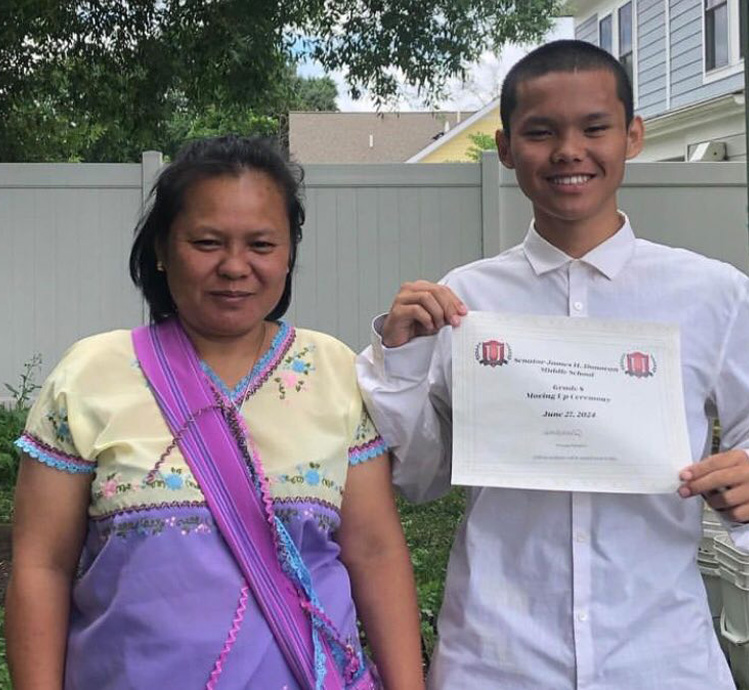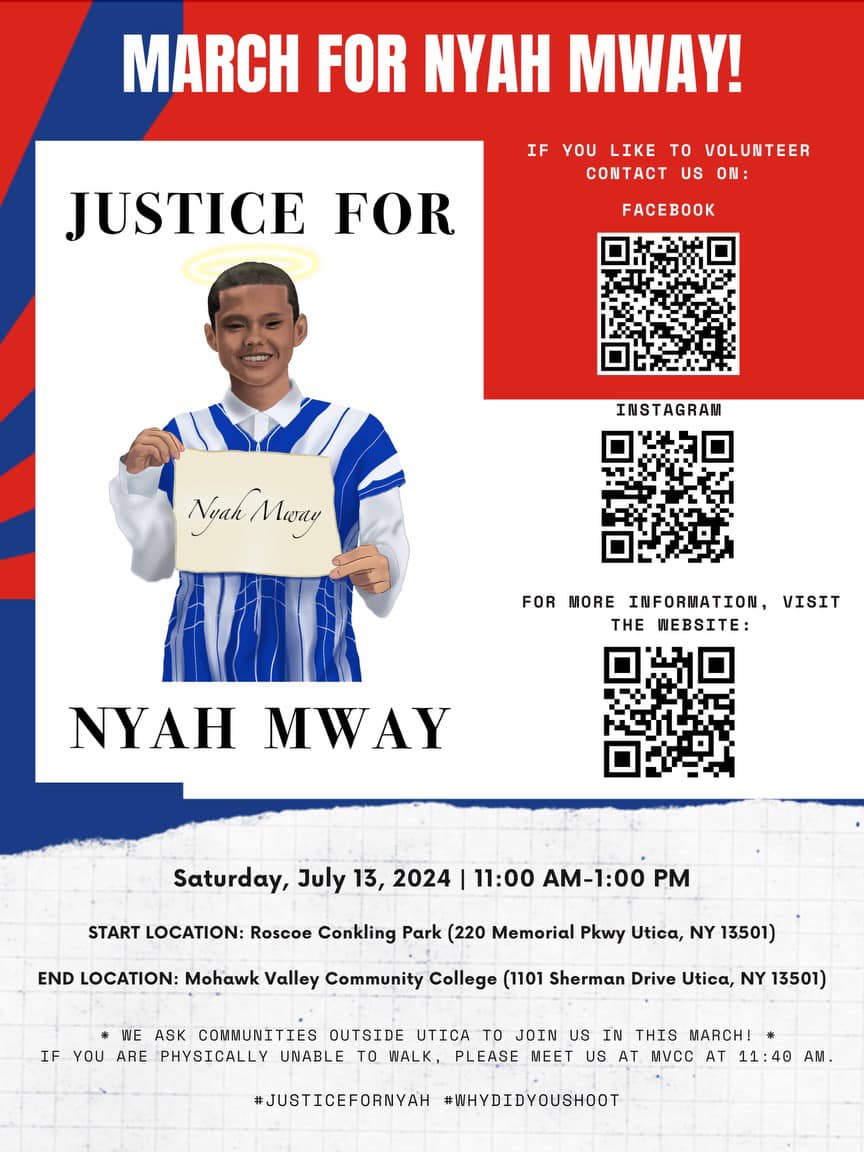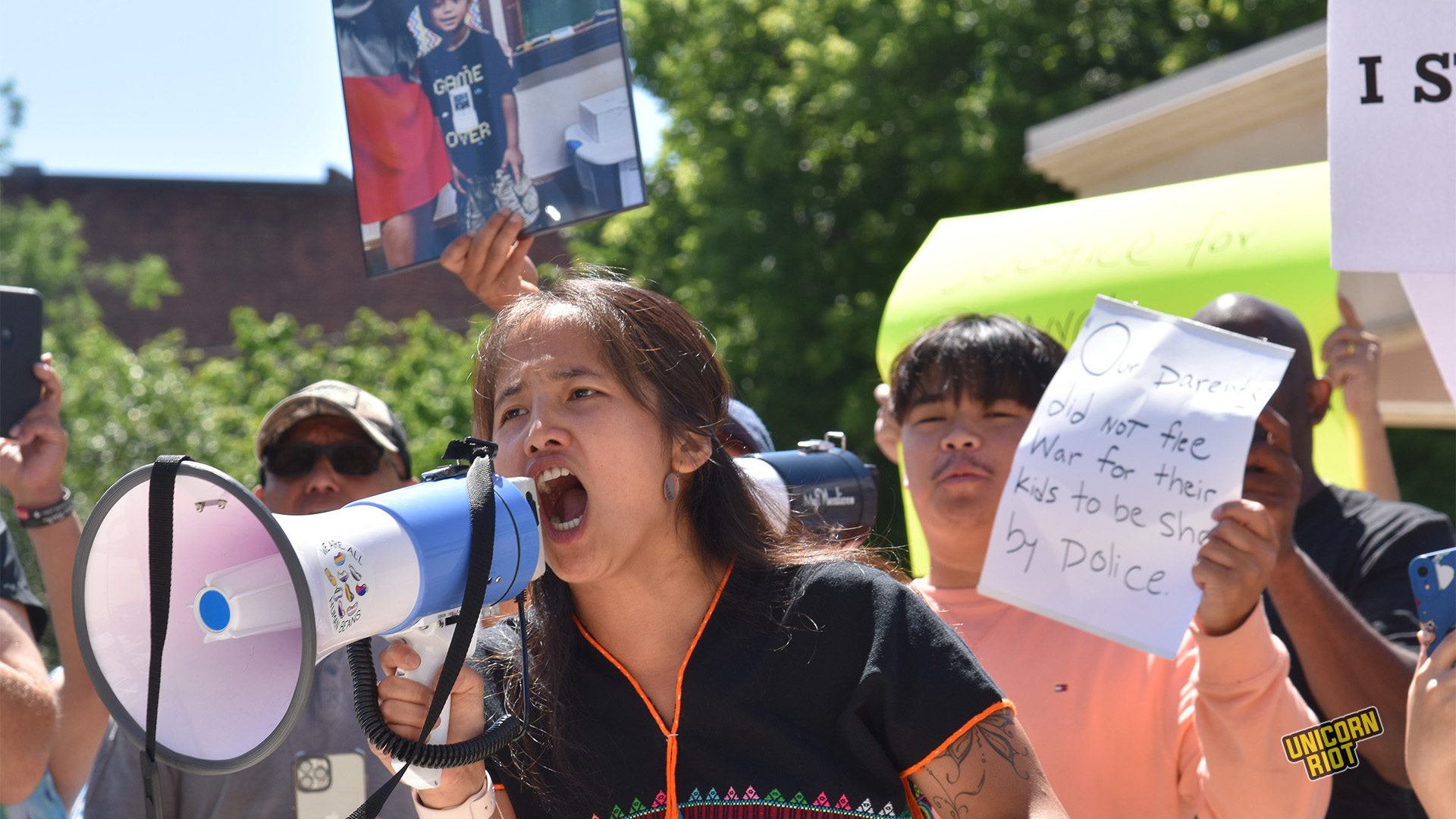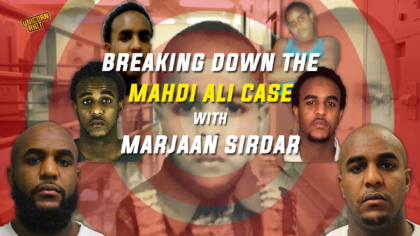Protests Erupt in Utica After Brutal Police Killing of 13-Year-Old Refugee
Utica, NY — Nyah Mway, a 13-year-old refugee from the Karen ethnic group in Myanmar (formerly Burma), had just graduated middle school in the small city of Utica, New York. His family was immensely proud of him, and a picture of him holding his graduation certificate alongside his smiling mother is prominently displayed in their home.

The family’s euphoria was violently cut short on the evening of June 28, when Mway and his friend were stopped by three police officers from the Utica Police Department (UPD) and two Oneida County Deputy Sheriffs on their walk home from a Bible study class and a graduation party.
Body camera footage was released by the UPD, but only from three of the officers who were on the scene. The footage shows a pedestrian stop, otherwise known as a stop-and-frisk — a controversial tactic of interrogating and searching someone based solely on “reasonable suspicion.”
Mere moments after the police encounter, Nyah Mway starts running down the street. In an edited body cam video released by the UPD, Mway turns toward Officer Bryce Patterson, who is then heard shouting, “He has a gun!” Patterson tackles Mway to the ground and repeatedly punches the boy in the head.
Officer Andrew Citriniti and Officer Patrick Husnay were also in pursuit of Mway. While Officer Patterson was still on top of the subdued child, Officer Husnay shoots Mway in the chest. The boy starts bleeding out on the sidewalk. One witness who recorded the shooting on her phone can be heard warning the police, “Careful, you’re on camera.”
When the shot rings out, the shocked and horrified woman yells, “Oh my God! He just shot him!” The police attempted, but ultimately failed, to take her phone after the shooting. The video soon became viral on social media.
Eyewitness accounts and statements from Officer Patterson suggest that Mway was not a threat to the officers while he was on the ground. The body cam of the visibly shaken and stunned Patterson captures him telling other officers, “Ultimately the gun came out right next to him.” Still concerned whether or not he was shot, he stated, “I was on top of [Mway]. I don’t know how [Husnay] got that shot. I was on top of him.”
Mway’s friend, whose name is being omitted for protection, later posted on Instagram that Mway “was just running, then they put him down, then the cop run up to Nyah. Nyah have [nothing] in his hand and he was on his back too. His hand was on his head.”
According to a statement released on June 29 on the UPD’s Facebook page, the boys were stopped because they were “walking in the roadway in violation of New York State Vehicle and Traffic law,” and that the officers were also investigating robberies in the neighborhood. However, there is no record of any 911 calls from Shaw Street from county 911 call records. Several neighbors said they were not aware of any robberies in the neighborhood.
Officers Patterson, Citriniti and Husnay are on paid administrative leave pending an internal investigation and concurrent investigation launched by the New York Attorney General’s Office of Special Investigation.
According to the UPD, a .177 caliber pellet gun was found at the scene of the killing.
Mayor Michael Galime and Chief of Police Mark Williams have withheld information on the presence of the two deputy sheriffs in press conferences and public statements. In an interview with Unicorn Riot, UPD Public Information Officer Lt. Michael Curley did confirm that Deputy Sheriffs Cook and Paciello were on scene that night and detained Mway’s friend. The Oneida County Sheriff’s office could not be reached for comment.
The majority, if not all, of the news coverage about Mway’s killing doesn’t mention the deputy sheriffs. Corporate media outlets and local authorities have followed a script all too familiar in response to similar tragedies across the U.S. that rests on both criminalizing and blaming the victim.
“The narrative was set by the police and the mayor immediately,” said Stephen Patterson, a Utica resident and Black activist. “Nyah Mway was already villainized from the moment he got on the news. People could forget about his age at 13 and see him as a dangerous adult or a super predator.”
The following morning, June 29, Mayor Galime stood next to Chief Williams for a press conference. Reporters, family and friends of the young boy, and other concerned residents packed Utica City Hall. As both the mayor and chief stumbled over their words, the entire event was punctured by shouts in English and Karen from those assembled.
Yadana Oo, a Karen activist who helped organize during the widespread uprising after the killing of George Floyd, was present. “We did not run from the persecution of the Burmese army to be persecuted here in America,” said Oo aloud.
As Mway’s mother was sobbing and others fought to keep back tears, the mayor’s invitation for the family to meet him was answered by Oo shouting that the mother “said she doesn’t feel comfortable being in the same room with killers!” The press conference abruptly ended amid the angry shouts of “no justice, no peace!”

Later that evening, several hundred residents filled Shaw Street at the location where Nyah Mway was killed by the police. An array of candles, flowers, and pictures of Mway were spread out across front lawns and the sidewalk to honor the boy. A dark stain permeated the concrete where Mway bled out. According to some Black residents who attended the vigil, a police officer asked them, “Why are you going? He wasn’t one of yours?” The prevailing feeling for some, however, is that this is not an isolated incident.
Stephen Patterson, who has been at many of the demonstrations in the wake of the police shooting, gave an impassioned speech to protesters at City Hall. “You’re not alone in this battle! You’re not alone,” he said. “I’ve been calling people from all over to come to the city of Utica, NY to put a stop to this. Today I sent the mayor of the city three videos by messenger of the same police officers beating the hell out of somebody, and of the same officers pulling over a Black man that’s in his driveway and busting his windshield out and getting ready to shoot.”
“Let me tell you something. We’ve been walked on all our lives, but when it comes down to a child, and it comes down to a foreigner, we love you! Let me say, I’m putting you all on the line right now. We are with you,” said Patterson.
Visibly fighting back his emotions, Patterson spoke about Nyah Mway. “I cried suddenly like a newborn baby for him because that’s my daughter driving in her car being pulled over by the Utica police. I might get that call. I might get that call that my daughter died to the hands of something that ain’t right.”
After the vigil, a spontaneous protest of 100 people gathered in front of the sole police station in the city. The crowd stared down dozens of police officers who had their rifles, handguns, and tasers at the ready, appearing prepared for battle. Several demonstrators threw rocks that broke the windshield of a police car. The standoff was intense, but no arrests were made, and the demonstrators departed without any other incidents of police violence.
Within days of the police killing, younger Karen activists gathered together to work closely with Mway’s family and launched the Justice for Nyah Mway campaign. They created a website and launched a fundraiser to support the family.
Kay Klo, a Karen activist who was born in Myanmar and moved to Utica as a refugee, emerged as one of the young leaders of this movement. She comes from a new generation of activists whose world view is informed by the endless array of police killings of civilians, and movements like Black Lives Matter that sprung up in protest to police violence and brutality.
Klo spoke with Unicorn Riot about how she is deeply aware of the trauma her people face in Myanmar and how that is passed on from one generation to the next. Karen people are an ethnic minority in Myanmar, and the Burmese army has been at war with them since 1949. Stories from Karen refugees who survived attacks and massacres from the army came up in the conversation.
Klo thinks that there are deeper reasons that explain why Mway might have run. “When you think about what refugees have gone through and especially in war where they have to flee when you see the military, when you see somebody in an army uniform, when you see somebody like a state authority, you run the other way,” she said.
It’s estimated that a quarter of Utica’s population is made up of refugees, and upward of 8,000 Karen people live in the city and surrounding communities. A long-standing refugee resettlement program in the city breathed new life into Utica, which quickly became known as “the city that loves refugees.”
“Our people, we’ve been through abuse,” said Klo. “I feel like people are seeing what’s happening again to our people. We went through war, and now we come to America, and we’re going through it again.” This sentiment has been expressed by many other Karen people in the past week.
Klo is fiercely critical of the city’s slogan. “It’s a lie,” she said. “Who showed up for the family? Who reached out to the family? The city didn’t, and that’s the city’s slogan … They love our cheap labor. They really love our exploited labor.” Klo feels that the local establishment is “manipulating us into thinking that they love us when in reality, they want to abuse us.”
Mayor Galime’s presence at a June 28 community meeting that roughly 300 residents attended, most of whom were Karen, drove this feeling home. What was originally intended as a community organizing meeting was derailed by the mayor who dominated the meeting, defended the police department, and refused to look the grieving family members of Mway in the eyes, according to attendees. That only encouraged residents to angrily shout him down.

Out of the chaos that’s engulfed the city following the killing of Mway, Klo and the other Karen activists have forged deep bonds of solidarity at the grassroots level across a diverse array of local communities and groups. A series of actions have sprung up from these new connections.
On July 1, hundreds of activists disrupted a Utica Common Council meeting and held protests outside of Utica City Hall and at the Utica State Office Building. The Justice for Nyah Mway campaign also has a list of demands, including the firing of the officers involved with killing Mway, investment into community and youth programs.
When the city government announced that the 4th of July fireworks were canceled in response to the killing of Mway, residents in the impoverished and predominantly Black and Asian neighborhood of Corn Hill held their own illegal fireworks display “to celebrate the life of Nyah Mway.” As bursts of gunpowder exploded in the sky above the throngs of people below, one resident excitedly shouted, “The police aren’t showing up tonight! They’re too afraid. We don’t need them anyway.”
There are murmurs of abolitionist sentiments in the demands and in community discussions that have since been held. Daily, activists are organizing in the community to build up more support for the fledgling campaign, focusing much of their energy on turning people out for a mass march organized for July 13, the day before the city’s highly popular 15km Boilermaker road race.



Over 1,000 people from across the U.S., Canada, and even Europe, many of them Karen, are expected to join thousands of locals in protests and shutting down city streets during Utica’s most important and profitable weekend of the year.
Klo does not see this as a one-time action. “We’re figuring out ways and strategizing ways to organize and bring people together,” she said. The Karen youth and other activists who have rallied around this cause are planning to organize for the long haul.
July 12: Utica Streets Shut Down by 1,000 During Justice for Nyah Mway March
Editor’s Note: This article initially spelled Utica Police Officer Patrick Husnay’s name incorrectly, the error has been fixed. We also had used “Burma” for “Myanmar,” and the article now refers to the country only as Myanmar, which is formerly Burma.
Follow us on X (aka Twitter), Facebook, YouTube, Vimeo, Instagram, Mastodon, Threads, BlueSky and Patreon.

Please consider a tax-deductible donation to help sustain our horizontally-organized, non-profit media organization:



